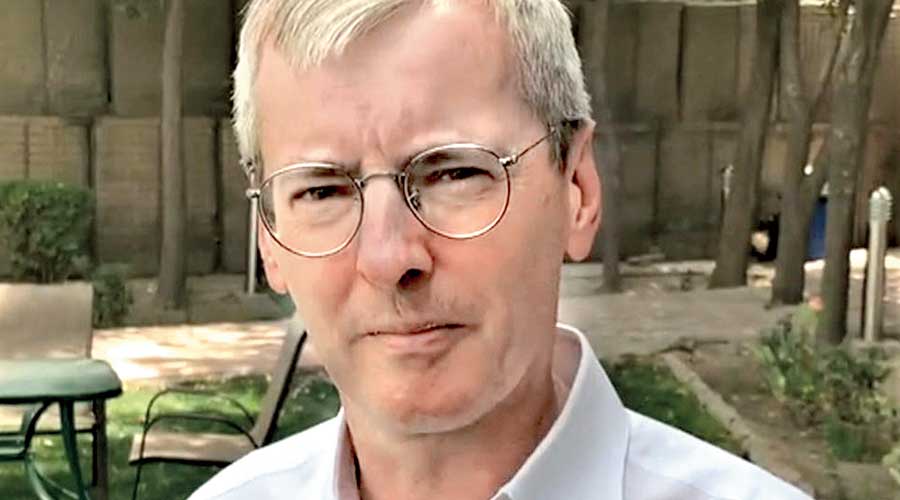The UN Security Council has on India’s watch dropped a direct reference to the Taliban in a statement urging all Afghan groups to shun support for terrorists, indicating a possible shift in the attitude of its members, including the Permanent-5, towards the group that is sanctioned under UNSC Resolution 1267.
“The members of the Security Council reiterated the importance of combating terrorism in Afghanistan to ensure the territory of Afghanistan should not be used to threaten or attack any country, and that no Afghan group or individual should support terrorists operating on the territory of any country,” the UNSC statement issued by Council president and India’s permanent representative to the UN, T.S. Tirumurti, said on Friday.
The statement has been issued in his name as India this month holds the rotating presidency of the UNSC.
Less than a fortnight ago, in the immediate aftermath of the fall of Kabul, the UNSC had made a similar observation in the statement — the only difference being that on August 16, the member countries had referred to the Taliban.
“The members of the Security Council reaffirmed the importance of combating terrorism in Afghanistan to ensure the territory of Afghanistan should not be used to threaten or attack any country, and that neither the Taliban nor any other Afghan group or individual should support terrorists operating on the territory of any other country,” the Council had said a fortnight ago.
The significant omission of the Taliban this time was first noted by Tirumurti’s predecessor at India’s permanent mission to the UN, Syed Akbaruddin.
Posting the two statements on Twitter, he said: “In diplomacy... A fortnight is a long time. The ‘T’ word is gone... Compared the marked portions of @UN Security Council statements issued on 16 August & on 27 August.…”
India had studiously avoided referring to the Taliban in its interventions at two different UN bodies where it spoke on the situation in Afghanistan since the fall of Kabul.
Tirumurti spoke about terrorism and India’s concerns about it but did not refer to the Taliban by name in his intervention during the deliberations on the situation in Afghanistan in the UNSC on August 16.
Likewise, at the UNHRC Special Session on Afghanistan last week, India’s permanent representative to the UN in Geneva, Indramani Pandey, too made no mention of the Taliban while flagging India’s concerns about Afghan territory being used by terrorist groups such as the Lashkar-e-Toiba and the Jaish-e-Mohammed.
The Taliban too have made what may be described as an overture to India.
Taliban leader Sher Mohammad Abbas Stanikzai on Saturday said: “We want to have political and economic relations with India like in the past, including the air corridor, but also we want to improve it. Afghanistan businesses would like access to the Indian market through Pakistan.”
This is the senior-most voice from the Taliban yet to speak on Afghanistan’s relations with its neighbourhood under the new regime. Stanikzai is a former army officer who had trained at the Indian Military Academy.
Stanikzai, while seeking Indian market access for Afghan businesses via Pakistan, did not disclose whether the Taliban would try to make it a reciprocal arrangement.
Currently, under the Afghanistan-Pakistan Transit Trade Agreement, goods from Afghanistan are ferried by land to India and offloaded at Wagah. But the trucks return empty as Pakistan has refused to allow Indian goods to be taken back via the same route which would, in turn, open up the Central Asian market to India.
Stanikzai also spoke about maintaining cultural ties with India, raising the question whether India’s best-known export to Afghanistan – Bollywood films and songs – would be allowed under the new regime. The Taliban had banned music and cinema during their first stint in power between 1996 and 2001, and their capture of Kabul saw several musicians break their instruments for fear of punishment.
There was no comment from India on the Taliban leader’s statements. New Delhi still views the situation in Afghanistan as fluid, given that the Taliban remain a ragtag group with no clear chain of command.
Avinash Paliwal, author of My Enemy’s Enemy: India in Afghanistan from the Soviet Invasion to the US Withdrawal, tweeted: “Driven by TB’s need for money & recognition, triggered by the need to counter-balance Pakistan, & shaped by internal politics b/w Haqqanis & other factions (Kandaharis/‘northerners’), this statement is just that — a signal. It’s unlikely to yield immediate results.
“Rifts within the TB, which many of us have been talking about, are re-emerging/asserting fast as the group struggles to govern & prevent an economic — & resulting political — disaster. It gives India an opening-of-sorts. But is (potentially) a poisoned chalice.”











